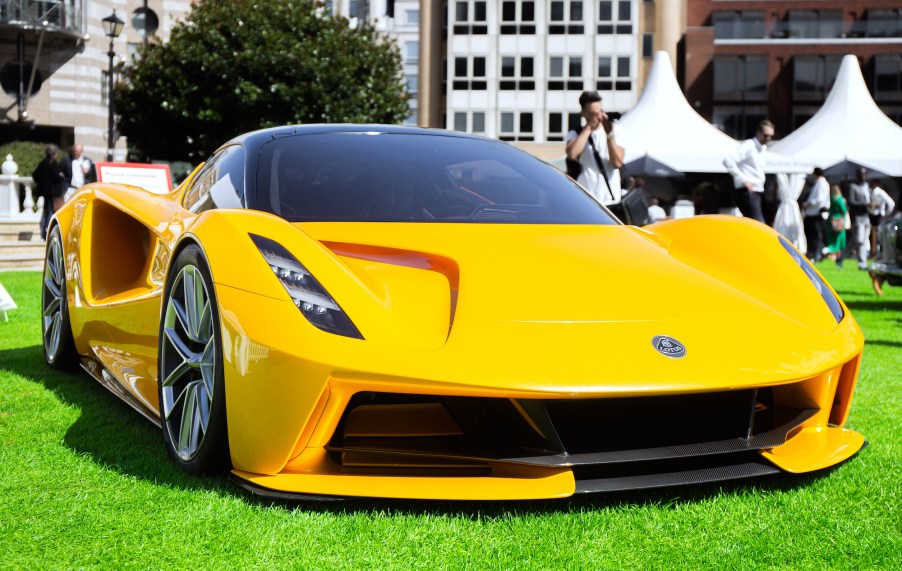
Do Lotus Cars Come in Automatic?
Lotus sports cars sell in low volumes, but the automaker has finally decided to make its lightweight vehicles more accessible to all drivers. Many Lotus cars offer optional automatic transmissions, making them considerations for drivers not interested in the art or effort of using a manual transmission. In its many decades, Lotus has offered a number of exotic cars, but it’s poised to make a change in its model lineup.
A history of Lotus

Lotus cars are known for their speed and maneuverability, Autoevolution reports. The brand got its start in 1946 when Colin Chapman built his first car in a garage in Britain. He called it the Austin Seven Special and won several races in 1948. Chapman built the first Lotus in 1949, and it packed a more powerful engine from Ford.
Chapman soon turned his attention to developing sports cars to enter the Formula 750. In 1952, Chapman, along with Michael and Nigel Allen, started Lotus Engineering Company. The first production car was the Lotus Mark VI, which had a 1.5-liter four-cylinder Ford Consul engine. The car was successful on the racetrack and with customers. A Lotus car won its first Grand Prix in 1959. Chapman died in 1982 at just 54 years old.
General Motors purchased Lotus in 1986 but sold it to A.C.B.N. Holdings in Luxembourg in 1993. It was sold again in 1996 to the carmaker Proton in Malaysia.
By 2017, Lotus was owned by Geely Automotive and Etika Automotive, Lotus explains. The automaker no longer races in Formula 1, but its sports cars are still well respected.
Today, Lotus produces three street-legal models: Elise, Exige, and Evora. The Elise debuted in 1995, the Exige was added in 2000, and the Evora joined the lineup in 2008. But two new models are on the horizon.
The automatic transmission options in Lotus cars
An automatic transmission was available on naturally aspirated Lotus Evora cars starting in 2012. The 2013 Lotus Evora S also received an automatic transmission option in addition to its standard six-speed manual transmission, Car and Driver reports. The Evora was the first Lotus to offer an automatic transmission since the Excel SA in the late 1980s and the first in the United States since the Eclat in the late 1970s, MotorTrend notes. The move to add an automatic transmission was intended to widen the customer base.
In 2014, Lotus announced an automatic transmission would soon be available on the Exige, Car and Driver explains. The Exige S Automatic was available in a coupe or roadster style, and both offered an optional six-speed Aisin transmission with Evora IPS (Intelligent Precision Shift).
Automatic transmissions remain available on two of the three current Lotus models: the Evora and Exige. In 2021, Lotus confirmed it would stop producing the Elise, Exige, and Evora this year. Several versions of each of the three models remain available, and Final Edition models have been released for the Elise and Exige.
About the Lotus Emira and Lotus Evija
The two latest models from Lotus are the Emira and Evija. According to Lotus, the Emira will be available in spring 2022. This mid-engine supercar draws from the inspiration of the Evija. The Emira offers two gas engines: a 2.0-liter turbocharged inline-four or a 3.5-liter supercharged V6 engine.
The 2.0-liter engine pairs with an eight-speed dual-clutch automatic transmission. The 3.5-liter engine is mated to a six-speed manual transmission with a limited-slip differential or a six-speed automatic transmission.
The Evija, which the automaker unveiled in 2019, is the first all-electric British hypercar, Lotus claims. It features a mid-mounted battery pack, giving it a similar style to other Lotus mid-engine sports cars. The Evija has a reported range of 215 miles. Its battery is connected to four electric motors, which Lotus says “feature integrated silicon carbide inverters and an epicyclic transmission on each axle of the four-wheel-drive powertrain.”
Lotus is at a turning point in the models it offers. But automatic transmissions will remain available for consumers.


